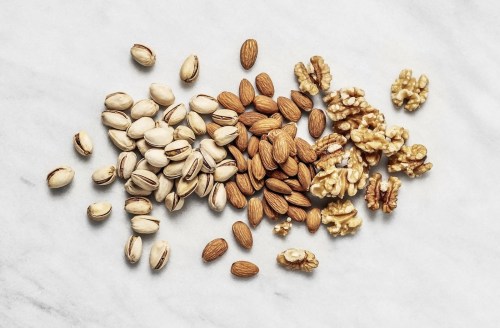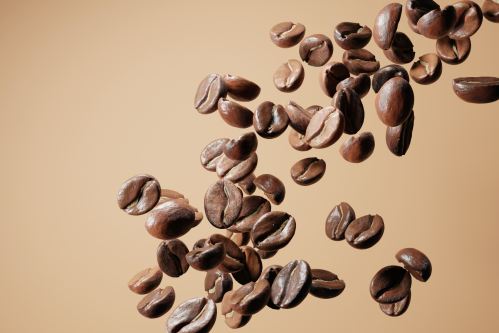Our editors independently select these products. Making a purchase through our links may earn Well+Good a commission
If you love to keep a DIY trail mix on hand for an energy boost or simply can’t stop at just one pistachio, then this one’s for you. After all, when it comes to choosing the healthiest nuts for your particular lifestyle, the truth is they can all play a part depending on the benefits you’re seeking.
Here, Nora Minno, RDN, a dietitian and certified personal trainer in New York City, and Scott Keatley, RDN, owner of Keatley Medical Nutrition Therapy, break down the most popular nuts and where they fit best into your everyday diet.
1. Best for healthy aging: almonds
It will come as no surprise that almonds are kind of the OG of nuts with their fibrous content and heart healthy fatty acids. But Minno says they are also one of the best natural sources of the antioxidant vitamin E, containing approximately 35 to 40 percent of the daily recommended intake per one-ounce serving.
“Studies have shown that vitamin E may slow down the worsening of memory loss in people with moderately severe Alzheimer’s disease,” she says. “Some evidence also suggests that adequate intake of vitamin E in the diet may be linked with a reduced risk of developing Parkinson’s disease.”
Keatley says almonds are also “the most accessible of the nuts,” pointing to the fact that they can be found everywhere, including in perfectly portioned 100-calorie packages.
Nutrition stats (per one-ounce serving): 6 grams protein, 4 grams fiber, 6 grams carbohydrates, 14 grams fat, 1 gram sugar.
2. Best for healthy weight management: pistachios
If you’ve ever spent time cracking open pistachio shells to make your way to the nut, then you know it takes a bit of work. Which is kind of the whole point when it comes to choosing a snack that can promote healthy weight management, says Minno.
“Since pistachios come in a shell, it takes longer to open them and eat them, and therefore you are less likely to overeat,” Minno says. “Remember: It takes about 20 minutes for your brain to get the signal that you’re getting full, so slowing down your eating can allow you time to actually feel full and not overeat in a short amount of time.” They are also low in net carbs and high in fiber, making them the perfect snack for a low-carb diet.
Nutrition stats (per one-ounce serving): 6 grams protein, 3 grams fiber, 8 grams carbohydrates, 13 grams fat, 2 grams sugar.
3. Best for heart health: macadamia nuts
The buttery macadamia nut boasts loads of antioxidants and phytonutrients that work to protect your body against disease and certain health conditions like high cholesterol, diabetes, and even cancer. But Keatley says their high monounsaturated fat content (good for your heart!) also makes them the fattiest of nuts. Totally fine in moderation, but you won’t want to overdo it.
Nutrition stats (per one-ounce serving): 2 grams protein, 2 grams fiber, 4 grams carbohydrates, 21 grams fat, 1 gram sugar.
4. Best for protein: peanuts
The classic nut—which is technically a legume like beans and peas—is a solid source of plant-based protein, with the most per serving of the other options on this list. As with macadamia nuts, you’ll want to be mindful of your consumption. Keatley — who says he enjoys peanuts from the shell every now and then—points out that peanuts are “loaded with omega-6 fatty acids,” which can create an inflammatory response in the body if consumed in excess.
Nutrition stats (per one-ounce serving): 7 grams protein, 2 grams fiber, 5 grams carbohydrates, 14 grams fat, 1 gram sugar.
Can’t get enough of peanuts? Here’s why an RD loves them, too:
5. Best for bones and skin: cashews
Minno says she loves to use cashews in place of milk in non-dairy or vegan sauces to create a butter-like, rich dish. But there’s more to the cashew than the five grams of protein it boasts per ounce.
“Cashews are one of the few raw food sources high in copper,” Minno says. “One ounce contains about 622 micrograms of copper, which is about 70 percent of the daily recommended amount for adults.” Minno says this is important given that copper deficiency has been associated with low bone density and osteoporosis (common problems for older women in particular). “Copper also plays an important role in maintaining collagen and elastin, which are important components of skin as well as other structures throughout the body,” she says.
Nutrition stats (per one-ounce serving): 5 grams protein, 1 grams fiber, 9 grams carbohydrates, 12 grams fat, 2 grams sugar.
6. Best for brain health: walnuts
Walnuts pack a significant punch of omega-3 fatty acids, which have been linked to increased cardiovascular health, improved cognitive function, decreased symptoms of depression and overall reduced inflammation.
Nutrition stats (per one-ounce serving): 4 grams protein, 2 grams fiber, 4 grams carbohydrates, 19 grams fat, 1 gram sugar.
7. Best for fighting inflammation: pecans
Sure, they are a holiday favorite, but the pecan certainly offers that makes them worthy of enjoying year-round. While it doesn’t rank the healthiest amongst nuts (Keatley says it’s the lowest in protein and highest in fat amongst the bunch), the pecan is high in gamma tocopherol, a form of vitamin E that has been associated with lower cholesterol and increased disease-fighting antioxidants in the body, making it a top contender amongst nuts that can help reduce cancer risk. It also has a decent amount of zinc (around 16 percent of your recommended daily intake), which has additional inflammation-fighting and immune-boosting benefits.
Nutrition stats (per one-ounce serving): 3 grams protein, 3 grams fiber, 4 grams carbohydrates, 20 grams fat, 1 gram sugar.
Looking for more rankings? Here’s how RDs judged your favorite peanut butter alternatives. And here’s what they think of the different alt-pastas at Trader Joe’s.
Sign Up for Our Daily Newsletter
Get all the latest in wellness, trends, food, fitness, beauty, and more delivered right to your inbox.
Got it, you've been added to our email list.











